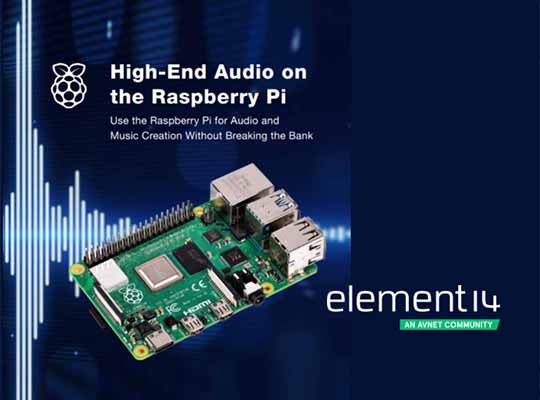Bangalore, India – element14 has released a new eBook for its members exploring the potential of Raspberry Pi for HD audio development and music creation. Audiophile makers typically rely on expensive systems to provide the best sound quality. With new add-on boards and fidelity software, Raspberry Pi is becoming a great option for HD audio enthusiasts.
Raspberry Pi is known for being a great tool for those learning to code and work with electronic hardware. New add-on boards are now available for the Pi 4 that offer top-of-the-line digital/analog converters (DACs) and amplifiers. Raspberry Pi has always had the hardware to produce high end audio and with these new HATs (hardware attached on top), the popular development board is now an excellent choice for audio editing and development on a budget.
Some of the new HATs highlighted in the eBook and available from element14 to strengthen Raspberry Pi’s audio capabilities include:
- JustBoom’s JBM-001 DAC/Amp HAT: The board comes outfitted with a digital to analog converter (DAC) and a headphone amplifier that provides a 32-bit/384 kHz frequency. It also includes line-level RCA and headphone amplified 3.5mm jack outputs and volume control. It draws its power directly from Pi. The board also provides a 112dB signal to noise ratio (SNR) and -93dB total harmonic distortion (THD +N at -1dB). It can be used with the Raspberry Pi A+, B+, and 2B. Community members have used the JBM-001 to design multi-room audio players, media center stations, and stand-alone HD audio players.
- Infineon’s MERUS audio amplifier HAT: A great add-on board designed for the Raspberry Pi Zero, this HAT is great for sound amplification. The board is equipped with Infineon’s MA12070P multi-level amplifier that provides up to 40 W of peak power. The add-on board draws its power from the Raspberry Pi and provides 24-bit/48 kHz audio playback. Complete hardware control, customization, and error monitoring are done via Linux Alsamixer. Its size allows users to task the amp with portable Pi projects, including players and speakers.
- Micro Nova’s AmpliPi multi-room/zone audio controller: The system is designed around a Raspberry Pi Compute Module 3+ and comes packed with PCM5102A and CM6206 audio DACs. The Pi can also communicate via I2C to an STM32F030 MCU integrated on a preamp board to control mixing and amplification systems. The AmpliPi is capable of streaming four independent sources to 6 stereo output zones, which can be expanded to up to 36 stereo output zones through daisy-chained extender units.
The eBook also highlights several software tools to make Raspberry Pi HD audio a reality. One of the better choices is the Sonic Pi. The live coding environment based in Ruby is versatile and allows users to create new sounds, work in a variety of musical styles, loop their audio, switch synths, and more. Other free software tools that work well with the Raspberry Pi platform include MilkyTracker and Tracktion Software’s Waveform DAW.
element14, an Avnet Company and global distributor of electronic components, which helps design engineers, maintenance and test engineers, makers, parents, and teachers develop the future generation of coders and products that apply technology to change our world for the better.
To read the full eBook and see all of the insights, please visit element14.com













